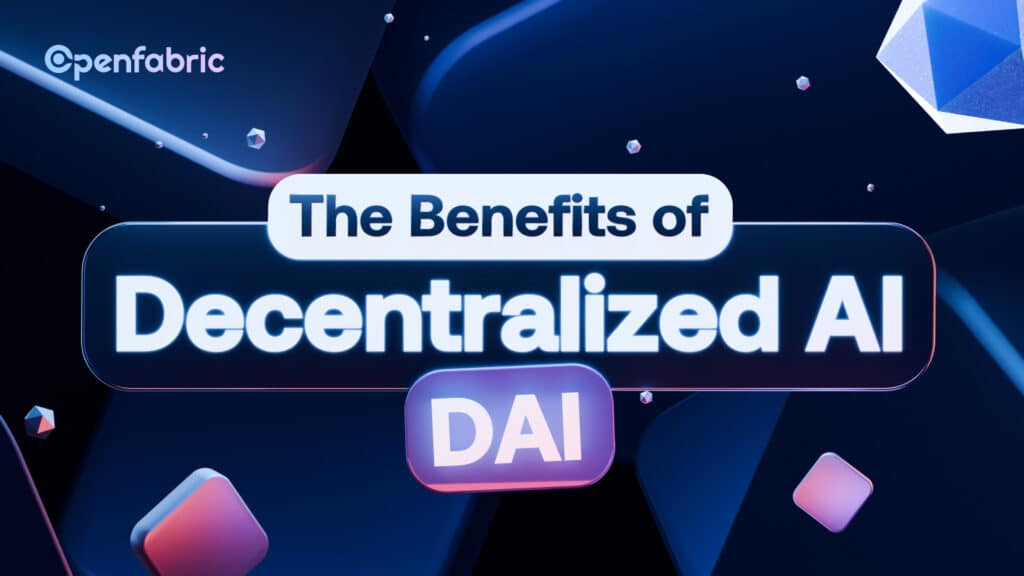
April 25, 2025 6 minutes read
The Benefits of Decentralized AI (DAI)

Recently, there have been reports of some artificial intelligent systems knowing more than they ought to know. A few weeks ago, users of the popular social media application, X (formerly known as Twitter), made concerning tweets about some AI tools interacting with them, using information that they did not expose it to, such as their first names. This is where decentralized AI comes in, to control issues like these. Later in this article, you will find that one of the benefits of decentralized AI (DAI) is giving users the power to control how their data is used to train AI.
Artificial Intelligence involves handling a lot of private and sensitive data. Data that, in the wrong hands, will be able to cause a lot of havoc. However, when this data is spread across a distributed network rather than a single, centralized entity, the chances of data misuse are greatly reduced. This is because there is transparency. Essentially, one of the benefits of decentralization is giving users a safe and transparent environment for their data.
In artificial intelligence, decentralization is yet to be a widely implemented idea. Decentralization first became popular with the introduction of blockchain technology. This allowed all the transactions on a blockchain to be recorded and viewable by all participants. Therefore, this ensured transparency and accountability, leaving no room for fraudulent acts.
In a similar vein, other industries started to adopt the idea of applying decentralization to their technologies. However, in artificial intelligence, the role of decentralization is similar but not entirely the same. Decentralized AI (DAI) represents a future of AI where users are not afraid of data theft or violation of privacy. There are many more benefits of decentralized AI which we will be considering shortly.
Let’s get right into it!
What is decentralized AI (DAI)?
Decentralized AI is a system of AI that carries out its operations across a distributed network of servers instead of a single one. It is unlike centralized AI whose activities are carried out on a central server or single entity. DAI leverages decentralized technologies such as blockchain and distributed ledgers to enable AI to be trained by users on their own data without compromising data privacy, security, or control. Therefore, with DAI users retain control over how, when, and where their data is used to train AI models.
5 benefits of Decentralized AI
Data privacy and control
The issue of data privacy has been on our lips since the beginning of this article. The incident highlighted at the beginning of this article is one of many where AI models seemed to have known “too much” about their users. Most users often describe this as being creepy or weird. Decentralized AI prevents this from happening. It gives you control over how much personal information should be used for the training of the AI model. In centralized AI technologies, there is a single server on which all the data and information are stored. Decentralization eliminates this central authority’s involvement with the user’s data.
Security
Some DAI uses blockchain-based technologies. These technologies provide a secure and transparent environment for AI training and its application. AI users want to know how their data is used and who is using it. This technology can trace the source of data misuse.. This open-source nature promotes transparency and accountability amongst users.
Flexibility and scalability
Decentralization in AI works on a chain of networks that store different data instead of all the data stored on a single entity and controlled by that same entity. This gives it a huge advantage because this nature offers a higher flexibility for specific use cases and needs. Instead of parsing through a large amount of data to make tweaks here and there on a central server, you can identify a smaller but functional server and adjust it according to your specific needs without compromising the function of the entire network.
Stability
DAI offers more stability as its computing power is distributed across several nodes. Therefore, it remains impenetrable to single points of failure or insults. In other words, for a decentralized AI network to fail, there have to be multiple points of failure which, in reality, is very rare. This gives you added stability and a sense of trust since access to one node or server does not mean a complete compromise of your data or failure of the AI system.
Accessibility and collaboration for AI developers.
Often, centralized AI limits AI technologies to big companies and developers while leaving startups to struggle. Decentralization breaks down barriers and gives AI developers access to the technology necessary for the development of their AI tools. This allows for the growth and development of AI technology in our society together with creating wealth for startups.
DAI also allows AI developers and organizations to share data and models in a decentralized manner. The goal of this is the advancement of artificial intelligence.
Enjoying the benefits of decentralized AI with Openfabric AI
Openfabric AI is a decentralized AI platform that is just what we need in this era where data privacy is essential in the development of AI models. Openfabric aims to democratize AI for startups by lowering the requirements needed for getting the necessary AI infrastructure and making the use of AI algorithms simpler. It uses a decentralized AI protocol that integrates AI with smart contracts, which ensures the security and transparency of AI solutions in addition to enhanced scalability and flexibility of these AI solutions.
Openfabric AI has a community composed mainly of AI innovators, data providers, service consumers, and infrastructural providers. This diverse community facilitates the efficient collaboration between these members of the community that you can also be part of. This collaboration aims to advance AI through the creation and use of new intelligent algorithms and services.
Here is a breakdown of the role of every member of this community:
- AI innovators: these are the technical experts who use their expertise to create practical AI algorithms capable of solving real-life problems.
- Data providers: they ensure the distribution of the vast amount of data necessary for the training and testing of AI algorithms.
- Service consumers: this is essentially the end-user that needs the developed AI algorithm to solve real-life problems.
- Infrastructural providers: they provide the hardware component that is needed by AI innovators for the running and training of AI algorithms.
Openfabric AI is the future of decentralized AI. It puts AI development and wealth creation, formerly limited to big companies, into our hands. The exciting news is there is room for everybody at Openfabric AI and we have saved you a special seat so that you too can be part of the future of decentralized AI.
Conclusion
The development of AI is still a work in progress, and we have come very far. However, it is becoming increasingly clear that we need decentralized AI to address most of the issues in AI. In essence, decentralized AI is the next step in our journey to AI evolution. Openfabric AI, at the forefront of this development, operates on a decentralized AI protocol and is indeed the future of decentralized AI.
Join Openfabric AI by visiting our WEBSITE today!

